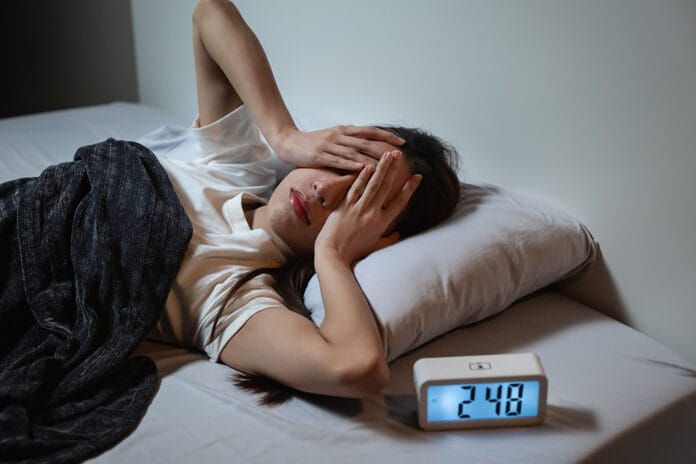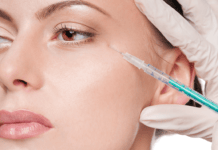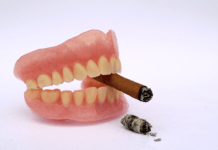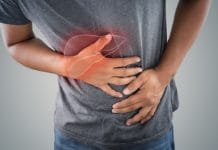I have a problem. OK, not just one but several. We are only addressing one today. I try every single trick for sleep on the planet. I know all too well the importance of a great nights’ sleep. I study it and do my best, but that does not mean I get a perfect night’s zzz’s.
I overly track my sleep, whether that be on a smartwatch, Fitbit, or Oura ring which in and of itself is an additional problem. I had taken supplements, listened to meditation, deep breathe, watched what I eat, and worn blue-blocking glasses when blue-blocking was cool. Our bedroom is freaking freezing, with dark curtains, no light, and even an eye mask, no dogs, caffeine only before 10 am, and reduced my alcohol consumption to negligible ‒ even during COVID.
Glory be. But I recently learned a new trick and a bit more science about sleep.
Awakened, But Can’t Go Back to Sleep?
According to Michael Breus, Ph.D., and sleep specialist, the average person wakes up two to three times a night for 30 seconds to a minute. This is often called “undisturbed awakenings” and are very normal. It can be a problem if you can’t get back to sleep. Often people wake in the middle of the night because they need to go to the bathroom. If that is you, a helpful hint is don’t turn on the lights because it activates your sympathetic nervous system ‒ that’s the fight-or-flight working in your body. You may have trouble dropping back into slumber.
Some awakenings are longer and more dramatic. The source could be a deficiency in magnesium that leads to restless sleep. An easy way to increase your levels is to eat a banana. Simple science hacks 101. Other magnesium-rich foods are dark leafy greens, seeds and nuts, squash, broccoli, dairy, figs, avocados, chocolate, and coffee (only in the morning). There are even concoctions of banana tea, of all things.
Estimates suggest nearly half of adult men and women suffer (and women and seniors are at higher risk) from magnesium deficiency.1 Magnesium plays a role in sleep because it promotes the production of gamma-aminobutyric acid (GABA).2 GABA’s big role in the body is to reduce the activity of neurons in the brain and nervous system that will help increase relaxation, reduce stress, and boost sleep. About 80% of people with hypertension that were treated with either hydrochlorothiazide or a single nondiuretic drug have been found to have a magnesium depletion problem.3 Hydrochlorothiazide reduces the production of a protein responsible for magnesium’s uptake to the kidneys. This is found especially for males 60+ years old. Magnesium deficiency is found to be associated with over 440 drugs.
Another awakening that I hear people talk about is waking at 3 am and then struggling to get back to sleep. I have had this issue and, with a little research, I found it can be a glucose problem. Dr. Breus is the author of Good Night: The Sleep Doctor’s 4-Week Program to Better Sleep and Better Health, The Sleep Doctor’s Diet Plan: Lose Weight through Better Sleep, and most recently, The Power of When. He spoke during a podcast I listened to last year about the dilemma of the almost ritual of middle-of-the-night awakenings.
I started intermittent fasting a while back, so my eating window is down to about seven hours, and the fast is then about 17 hours. I know that for brain health and longevity, the science is there proving the benefits of intermittent fasting.4,5 But being without nutrients, the right kinds especially can wreak havoc on our sleep systems.
During sleep, our body goes into fasting mode, and, to keep up the energy requirements of the brain, the adrenal hormone cortisol is released. Sometimes waking up at 3:00 am is the body’s way of saying, “Dude, I have nothing left to burn, and the last time I got fed was 7:00 pm. We are now approaching some serious REM or dream sleep, and I need glucose to get me through.”
Sustenance During REM
If you look at an electroencephalogram (EEG), REM’s brain activity is about the same as being awake.6 During REM sleep, your brain is using more glucose than when you are awake, and, during repair sleep or stage 4 sleep, you burn just as much glucose as being awake.7
When your brain thinks you have run out of fuel and you get low blood sugar, it will wake you up. Your body is searching for the glucose to use your cortisol spikes to push the metabolic process and wakes you up to eat. This hormonal reaction starts the process of creating insulin, which uses cortisol. Remember, cortisol is what helps wake you up in the morning, so that is not what you want to be going on at night!
It is important to remember that a diet that stabilizes blood sugar levels during the day will help sustain you at night. Some scientists suggest a 250-calorie snack like apple slices with almond butter before bed between an hour to 90 minutes before hitting the hay 70% carbs and 30% protein. The high-carb content releases serotonin and makes you feel more comfortable, and serotonin converts to melatonin, your sleep hormone.
Larry Wilson, MD, and a specialist in adrenal fatigue offers a solution for the 3 am awakenings, which comes in the form of a cocktail. The adrenal cocktail’s recipe is four ounces of orange juice, 1/4 teaspoon of cream of tartar, and 1/4 teaspoon of Himalayan salt.8 Excuse me? This unique concoction is said to help the liver repair itself, is rich in potassium, helps to stabilize blood sugar through the night, and has essential minerals. It is all over the internet, but I couldn’t seem to find a study in PubMed. Sorry, next.
A Trick for Sleep
A trick from Dr. Michael Breus is a bit more up my alley ‒ honey. One teaspoon of raw honey before bed. Honey causes a small spike in insulin levels, and insulin can stimulate the release of tryptophan in the brain. Tryptophan will be later converted to serotonin, the hormone of relaxation and good mood. Finally, serotonin will be converted to melatonin which will inhibit the release of insulin and it will stabilize your blood sugar levels at night.
Raw honey is the key because it is unprocessed, and pasteurization lowers antioxidants and can change the benefits. Manufacturers will add sugar in the pasteurization process, and sugar dramatically negatively affects sleep by reducing sleep quality, stimulating appetite and cravings, increasing inflammation, and affecting a healthy gut.
For folks that follow Keto, honey won’t work. The solution can be guava leaf tea. Guava itself is known to be filled with vitamin C, lycopene, and antioxidants, including quercetin and other flavonoids.9 The young leaves have been used in tea for centuries in Mexico and South America, and the potassium in the tea has been found to help normalize blood pressure.10 Additionally, guava leaf tea can:11
- Manage diabetes
- Lower cholesterol
- Promote weight loss
- Great for the brain, containing B3 and B6 vitamins
- Boosts immunity and improves sleep quality
Guava leaves extract may also improve sleep by suppressing stress, and magnesium is one of the essential elements in guava. When made into tea, studies show the power for keeping blood sugar stable.12 Additionally, the tea helps prevent sugar spikes when ingested with meals.12
I read a little something that rinsing the mouth with guava leaf extract might reduce gum disease in people with gingivitis. One study found that daily use of .15% guava leaf extract-based mouthwash was as effective as a standard mouthwash in reducing bacteria, redness, and swelling in patients with severe gingivitis.13,14 I am not hanging my hat on throwing away the toothbrush and interproximal cleaning devices quite yet, but these are interesting uses for guava.
I wish you restful sleep always. I have a splash of honey, Greek yogurt, and blueberries most nights after dinner. Does it work? Perhaps, but not all the time.
*If you are a diabetic, have hypoglycemia, or have underlying health conditions, please always consult your doctor.
Need CE? Check Out the Self-Study CE Courses from Today’s RDH!
Listen to the Today’s RDH Dental Hygiene Podcast Below:
References
- DiNicolantonio, J.J, O’Keefe, J.H., Wilson, W. Subclinical Magnesium Deficiency: A Principal Driver of Cardiovascular Disease and a Public Health Crisis [published correction appears in Open Heart. 2018 Apr 5; 5(1): e000668corr1]. Open Heart. 2018; 5(1): e000668. doi:10.1136/openhrt-2017-000668. Retrieved from https://pubmed.ncbi.nlm.nih.gov/29387426/
- Möykkynen, T., Uusi-Oukari, M., Heikkila, J., et al. Magnesium Potentiation of the Function of Native and Recombinant GABA(A) Receptors. Neuroreport. 2001; 12(10): 2175–2179. Retrieved from https://www.ncbi.nlm.nih.gov/pubmed/11447329
- Seelig, C.B. Magnesium Deficiency in Two Hypertensive Patient Groups. South Med J. 1990; 83(7): 739-742. doi:10.1097/00007611-199007000-00004. Retrieved from https://pubmed.ncbi.nlm.nih.gov/1695392/
- Martin, B., Mattson, M.P., Maudsley, S. Caloric Restriction and Intermittent Fasting: Two Potential Diets for Successful Brain Aging. Ageing Res Rev. 2006; 5(3):3 32–353. doi:10.1016/j.arr.2006.04.002. Retrieved from https://www.ncbi.nlm.nih.gov/pmc/articles/PMC2622429/
- Brandhorst, S., Choi, I.Y., Wei, M., et al. A Periodic Diet that Mimics Fasting Promotes Multi-System Regeneration, Enhanced Cognitive Performance, and Healthspan. Cell Metab. 2015; 22(1): 86–99. doi:10.1016/j.cmet.2015.05.012. Retrieved from https://www.ncbi.nlm.nih.gov/pubmed/26094889
- Purves, D., Augustine, G.J., Fitzpatrick, D., et al. Editors. Neuroscience. 2nd edition. Sunderland (MA): Sinauer Associates; 2001. Stages of Sleep. Retrieved from https://www.ncbi.nlm.nih.gov/books/NBK10996/
- Katayose, Y., Tasaki, M., Ogata, H., et al.Metabolic Rate and Fuel Utilization during Sleep Assessed by Whole-body Indirect Calorimetry. Metab Clin Exp. 2009;58: 920–926. Retrieved from https://pubmed.ncbi.nlm.nih.gov/19394978/
- Why Do I Always Wake Up at 3am? (n.d.) Rejuvenate Institute of Natural Health. Retrieved from http://www.rejuvinstitute.com/why-do-i-always-wake-up-at-3am
- Kumar, M., Tomar, M., Amarowicz, R., et al. Guava (Psidium guajavaL.) Leaves: Nutritional Composition, Phytochemical Profile, and Health-Promoting Bioactivities. Foods. 2021; 10(4): 752. doi:10.3390/foods10040752. Retrieved from https://www.ncbi.nlm.nih.gov/pmc/articles/PMC8066327/
- He, F.J., MacGregor, G.A. Beneficial Effects of Potassium on Human Health. Physiol Plant. 2008; 133(4): 725-735. doi:10.1111/j.1399-3054.2007.01033.x. Retrieved from https://pubmed.ncbi.nlm.nih.gov/18724413/
- Luo, Y., Peng, B., Wei, W., Tian, X., Wu, Z. Antioxidant and Anti-Diabetic Activities of Polysaccharides from Guava Leaves. Molecules. 2019; 24(7): 1343. Retrieved from https://doi.org/10.3390/molecules24071343
- Deguchi, Y., Miyazaki, K. Anti-hyperglycemic and Anti-hyperlipidemic Effects of Guava Leaf Extract. Nutr Metab (Lond). 2010; 7: 9. doi:10.1186/1743-7075-7-9. Retrieved from https://www.ncbi.nlm.nih.gov/pmc/articles/PMC2831039/
- Ravi, K., Divyashree, P. Psidium Guajava: A Review on its Potential as an Adjunct in Treating Periodontal Disease. Pharmacogn Rev. 2014; 8(16): 96–100. doi:10.4103/0973-7847.134233 Retrieved from https://www.ncbi.nlm.nih.gov/pmc/articles/PMC4127827/
- Nayak, N., Varghese, J., Shetty, S., et al. Evaluation of a Mouthrinse Containing Guava Leaf Extract as part of Comprehensive Oral Care Regimen- A Randomized Placebo-controlled Clinical Trial. BMC Complement Altern Med. 2019; 19(1): 327. doi:10.1186/s12906-019-2745-8. Retrieved from https://www.ncbi.nlm.nih.gov/pmc/articles/PMC6873761/











